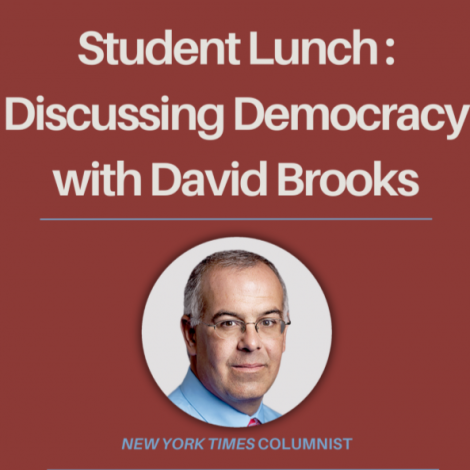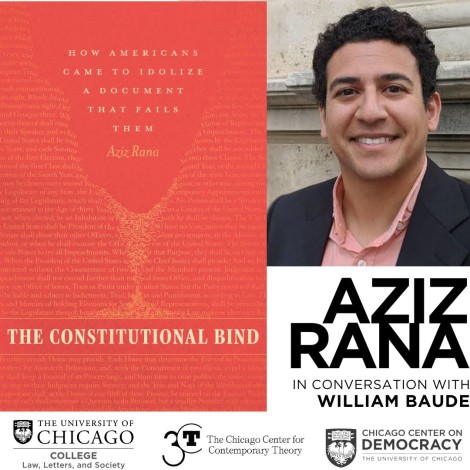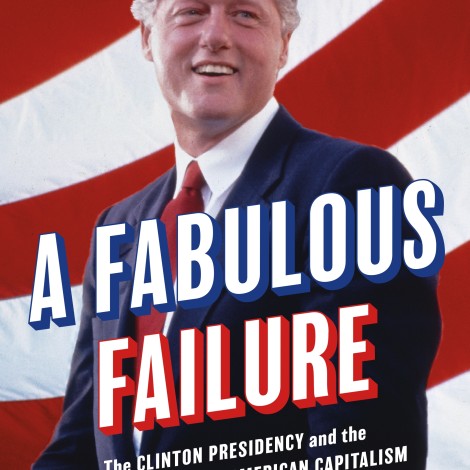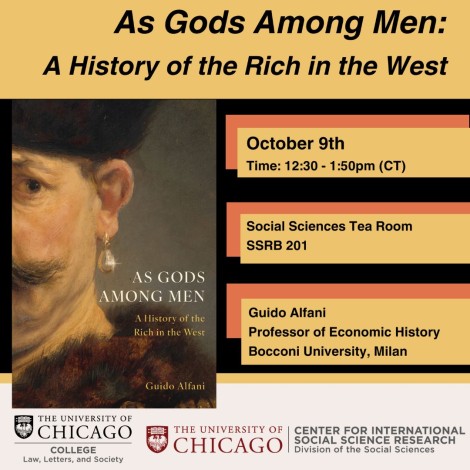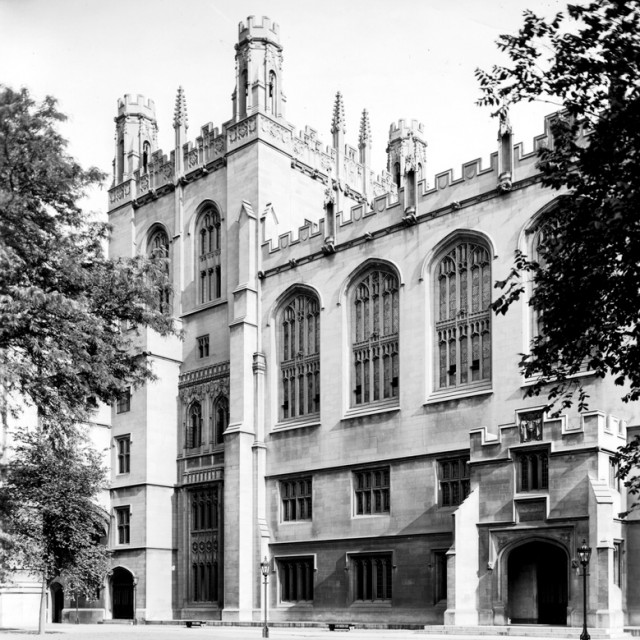
Announcements
LLSO major Elijah Jenkins named 2026 Marshall Scholar (12/9/25)
LLSO major Sophie Tedesco awarded Hugo F. Sonnenschein Medal of Excellence (5/28/25
LLSO major Mónica Ruiz House selected as Project for Peace Grantee and awarded the Hugo Sonnenschein Medal of Excellence, the highest honor bestowed upon a UChicago undergraduate (5/24)
LLSO major Ethan Ostrow selected as a Marshall Scholar (12/23)
LLSO major Estrella Hernandez receives a Fulbright English Teaching Assistant Award (5/23)
- Thesis Submission Deadlines:
- Winter: Noon on January 23rd, 2026
- Spring: Noon on April 10th, 2026
- Focus Field Forms due on November 15th, 2025
- Submissions for Charles Wegener Essay Competition due at 5pm on May 25th, 2026
- Application Portal Opens
- November 18th, 2025
- Informational Session
- November 20th, 2025
- Application Workshop
- Winter quarter date TBA
- Application Portal Closes
- January 14th, 2026
- Admissions Decisions Sent Out
- Week of January 26th
- Welcome Event for Newly-Admitted Students
- TBA
Events
Tour of the Law Office of the Cook County Public Defender
February 6, 2026 | 1:00 p.m. | 59th Street Metra Station
The right to legal representation is enshrined in the U.S. Constitution, both through elected government officials and public defenders. We will be exploring the role of the latter on our rights in a democracy through a tour of the Law Office of the Cook County Public Defender, along with a Q&A with attorneys. This panel will host attorneys who are decades into their careers, along with newcomers to the Public Defender’s Office.
Join the Chicago Center on Democracy and Law, Letters, and Society to learn more about the day-to-day life of a public defender, how to enter the field, and more.
Light refreshments will be provided. We request that you dress business casual. Please meet at the 57th Street Metra Station no later than 1:00 on January 23rd to catch the 1:07 train. We will be providing all Metra tickets. The tour will begin at 1:45, and the panel will end at 3:15.
Law, Letters, and Society Student Panel
January 6, 2026 | 11:00 a.m. | SSRB 224
Considering applying to Law, Letters, and Society? Current second-year students are invited to attend a panel with current LLSO students. Ask questions about their successful applications, major requirements, program culture, and extra curricular opportunities in an open forum.
Presented with The LLSO Student Board.
LLSO Open House + Application Kick-off
November 20, 2025 | 5:00 p.m. | KENT 120
Law, Letters, and Society welcomes first and second-year undergraduate students to our Open House and Application kick-off!
This is an opportunity to learn more about our program from the Program Director and Director of Undergraduate Studies. We will also talk about the application process, open to second-year students starting November 18 through January 14.
Stop by for donuts, coffee and to learn more about LLSO!
Sovereignty, Disrupted: The roles of energy and law in Africa and beyond
October 30, 2025 | 12:30 p.m. | John Hope Franklin Room, SSRB 224
The current conjuncture – in which states disrupt markets, energy markets disrupt states, and both are undermined, challenged, and re-made by international law – raises basic questions about (environmental) justice, sovereignty, agency, and sustainability. Focusing on the movement for Just Energy Transitions in Africa, this paper seeks to illuminate the nascent potential of different modes and projects of ‘insurgent counter-sovereignty’—the category of non-state non-capitalist grassroots worldbuilding posited by Mann and Wainwright’s Climate Leviathan. The paper begins by critically discussing the typology proposed by these authors and its relative success in describing the past fifteen years of global climate politics. After reviewing the current landscape of energy transitions in Africa, the paper then gives examples of how international law can either thwart or assist environmental justice claims, and by extension, strengthen or subvert modes of sovereignty. It concludes with reflections on ways that different modes of counter-sovereignty can combine to realize more just outcomes and more sustainable transnational solidarity.
-
Andrew Lawrence (Wits Business School, University of the Witwatersrand, Johannesburg) has over twenty years of experience teaching and researching in Africa, Europe, and North America. Affiliations prior to joining the faculty of the African Energy Leadership Centre of the Wits Business School include the University of Virginia, City University of New York, and University of Edinburgh. He has also been a visiting professor at the Vienna School of International Studies, Austria, and visiting Erasmus Professor at l’Università degli Studi di Napoli L’Orientale as well as visiting research scholar at the European University Institute, in Italy.
Presented in partnership with the Department of Race, Diaspora, and Indigeneity, the Committee on Environment, Geography and Urbanization, the Department of Political Science, and the African Studies Workshop.
This event is free and open to the public.
FALL WELCOME EVENT What’s Happening Here?: Fascism as Past and Prologue with John Ganz
October 8, 2025 | 5:15 p.m. | SSRB 122
For the past decade, there’s been a lively public debate over whether America faces a fascist threat. What have we learned, if anything, from this discussion? Is fascism a living possibility in today’s world or merely a historical phenomenon?
Watch a recording of this event here.
—
John Ganz is the New York Times best-selling author of When the Clock Broke: Con Men, Conspiracists, and How America Cracked Up in the Early 1990s (Farrar, Straus and Giroux, 2024). He writes the Unpopular Front newsletter on Substack, and his work has appeared in The Washington Post, Harper’s Magazine, Artforum, the New Statesman, and other publications.
—
Presented in partnership with the Chicago Center for Contemporary Theory
Registration for this event will open in mid-September.
This event is free and open to the public, and registration is recommended. Please email us at ccct@uchicago.edu if you require any accommodations to enable your full participation.
Past Events
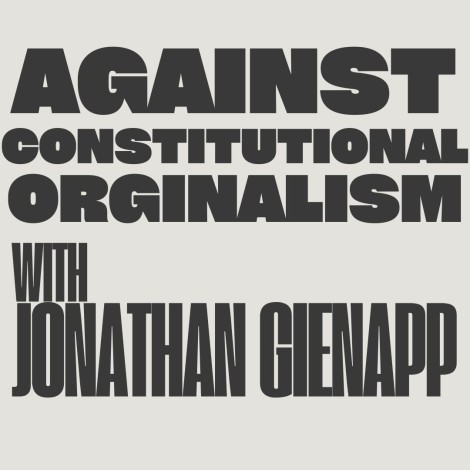
AGAINST CONSTITUTIONAL ORGINALISM with Jonathan Gienapp
April 25, 2025
Law, Letters, and Society with Chicago Center on Democracy welcomes Jonathan Gienapp, Associate Professor of History and Associate Professor of Law, Stanford University, on his latest book Against Constitutional Originalism: A Historical Critique.
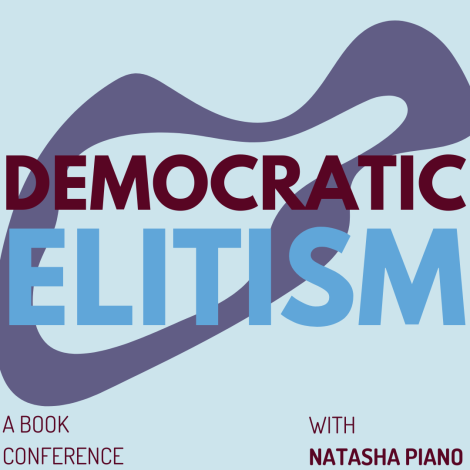
BOOK CONFERENCE Democratic Elitism with Natasha Piano
April 23, 2025
The Forum on Law and Legalities along with Law, Letters, and Society presents a book conference on Natasha Piano’s (Assistant Professor of Political Theory in the Department of Political Science at UCLA) new book, Democratic Elitism: The Founding Myth of American Political Science. The conference will be chaired by Jonathan Levy with comments by James Sparrow, Susan Stokes, and Sabrina Marasa
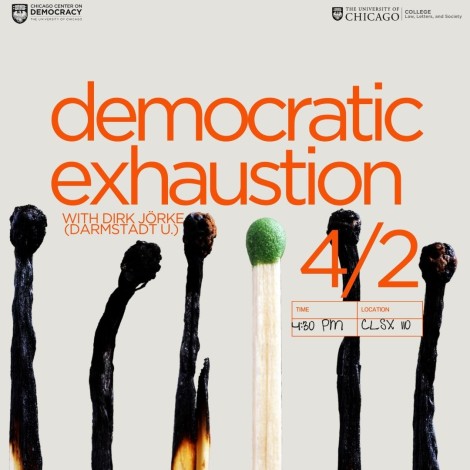
Democratic Exhaustion
April 2, 2025
Law, Letters, and Society with the Chicago Center on Democracy welcome Dirk Jörke for “Democratic Exhaustion”.
Abstract:
For several years now, people have been talking about a crisis of democracy. Articles and books on the subject often end with proposals for revitalizing democracy, whether through institutional reform or by calling on citizens to defend democracy. However, the possibility that this is not a temporary crisis but a transition to a new regime is ignored.
In contrast to this popular narrative, I would like to argue that the process of modernization is undermining the preconditions for democracy and that we are currently experiencing a kind of tipping point.
I will develop this argument in three steps. First, I will briefly recall theoretical considerations that assert a positive relationship between the process of modernization and democracy. However, the optimism associated with this has been exhausted (1). In a second step, I will argue that modernization and democracy are not mutually supportive, but that modernization undermines the foundations of democracy, at least beyond a certain threshold. I will focus on processes of globalization, heterogenization, acceleration, and digitalization. The thesis is that all of these processes undermine the social preconditions for the existence of democracy. (2). This leads to the conclusion that modern democracies are increasingly confronted with negative "ratchet effects" that cannot be reversed (3).
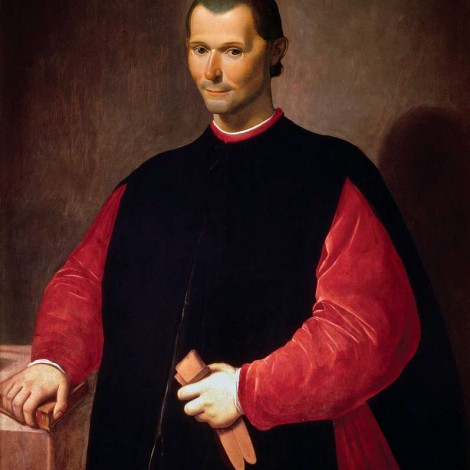
Machiavelli on Tyranny: Giovanni Giorgini and John McCormick in Conversation
March 6, 2025
The Law, Letters, and Society Student Board brings together two leading experts in political philosophy to explore Machiavelli’s seminal ideas on power, governance, and tyranny. Professor Giovanni Giorgini will discuss Machiavelli’s perspectives on ancient tyranny, and Professor John McCormick will examine Machiavelli’s critique of the Medici’s rule. This dialogue-oriented event invites attendees to delve deeper into Machiavelli’s enduring influence on discussions of political morality, state authority, and contemporary governance. By juxtaposing two scholarly viewpoints, the conversation will illuminate the complexity of Machiavellian thought and its resonance in modern debates on leadership and ethics.
This event is presented in conjunction with The Forum on Law and Legalities, Fundamentals, The Chicago Center for Contemporary Theory.

Rick Hasen on Election Law and the 2024 Presidential Race
October 8, 2024
The Chicago Center on Democracy, and Law, Letters, and Society invite undergraduate students to chat with Rick Hasen, the Gary T. Schwartz Endowed Chair in Law at UCLA and author of A Real Right to Vote: How a Constitutional Amendment Can Safeguard American Democracy, over Zoom.
Our gathering will feature a discussion based around Hasen’s internationally recognized expertise in election law and Americans’ constitutional right to vote ahead of the 2024 Presidential race, allowing students to bring in questions for Hasen to discuss, and provide their own insights and perspectives , anticipating an enriching exchange over Zoom!
Student Lunch: Discussing Democracy with David Brooks
MAY 15, 2024 @ 12:30 pm | Social Science Research Building, Tea Room (Room 201)
The Chicago Center on Democracy, and Law, Letters, and Society invite students to chat with New York Times opinion columnist David Brooks over a delicious lunch.
Our gathering will feature an informal discussion on democracy-related topics, allowing students to bring in questions for Brooks to discuss, and provide their own insights and perspectives , anticipating an enriching exchange over lunch!
Aziz Rana On “The Constitutional Bind: How Americans Came To Idolize A Document That Fails Them”
MAY 9, 2024 @ 5:30 pm | Social Science Research Building, Room 122
LLSO, along with The Chicago Center for Contemporary Theory and The Chicago Center on Democracy welcome Provost’s Distinguished Fellow at Boston College Law School, Aziz Rana, discussing his book, The Constitutional Bind: How Americans Came to Idolize a Document That Fails Them with William Baude (Harry Kalven, Jr. Professor of Law andFaculty Director, Constitutional Law Institute).
This is the official welcome event for the Law, Letters, and Society class of 2026.
This event was recorded. You can view the recording here.
Book Talk: Nelson Lichtenstein on A Fabulous Failure: The Clinton Presidency and the Transformation of American Capitalism
November 8, 2023 @ 5:00 pm |Social Science Research Building, John Hope Franklin Room (Room 224)
Law, Letters, and Society is proud to welcome Nelson Lichtenstein for a discussion of his new book, A Fabulous Failure: The Clinton Presidency and the Transformation of American Capitalism, co-authored with Judith Stein
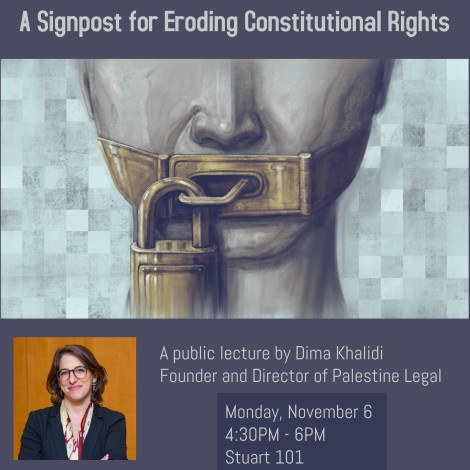
The Palestine Exception to Free Speech: A Signpost for Eroding Constitutional Rights
November 6, 2023 @ 4:30 pm | Stuart Hall, Room 101
with Dima Khalidi, Founder and Director of Palestine Legal
Amid a nationwide push to curtail the teaching of institutional racism and the dark sides of US history, we can learn important lessons from another subject on which campus communities have long experienced attacks on free speech and academic freedom: Palestine. In what can only be characterized as a “Palestine
Exception to free speech,” academics, students, and others who speak out for Palestinian rights are routinely falsely accused, investigated, surveilled, harassed, and sometimes suffer severe consequences to their reputations and careers. Right-wing efforts to dictate what academics and others can and can’t say, teach, or write are proliferating. What is at stake? What can we learn from Palestinians and their allies whose histories, narratives, and experiences are constantly denied, erased, and criminalized, even in academia? How can we ensure that universities and other entities can be bastions of academic freedom and free speech, and not enforcers of corporate, lobbyist, and governmental political litmus tests?
Book Talk: As Gods Among Men with Guido Alfani
OCTOBER 9, 2023 @ 12:30 pm | Social Science Research Building, Tea Room, Room 201, 1126 E 59th St.
Join CISSR and Law, Letters, Society as we welcome Guido Alfani to speak on his upcoming book called As Gods Among Men: A History of the Rich in the West forthcoming from Princeton University Press.





